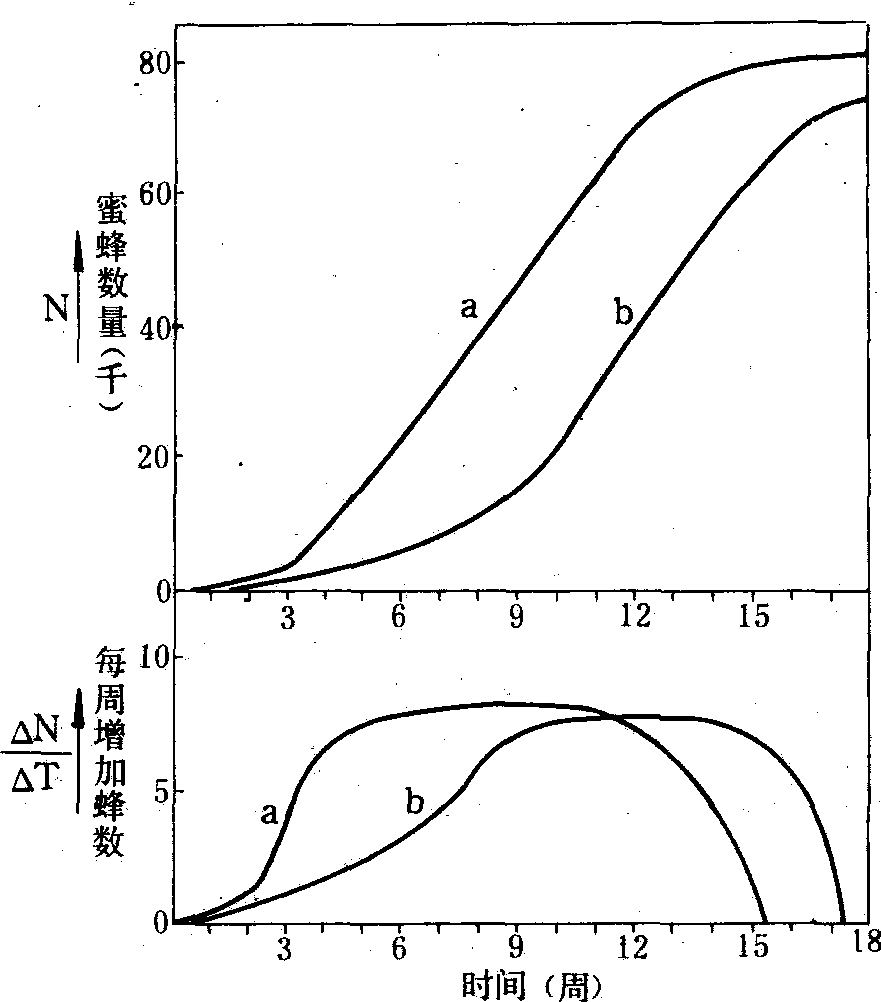种群增长率
见种群出生率。
种群增长率population growth rate
种群增加的数目与所经历时间的比值。在研究种群增长时,种群增长率是最重要的参数。
种群增长率用△N/△t表示种群绝对增长率,△N/N·△t表示种群特殊增长率(又称比增长率)。△N是种群个体的增量,△t是实现△N的时间增量,N是种群数量。用特殊增长率可以比较不同大小种群的增殖力。在不同时间种群增长率是有差别的,当△t取无穷小值时,便可求得相应的瞬时增长率dN/dt和瞬时特殊增长率dN/N·dt。瞬时增长率一般不能直接测量,但可以用一定的数学方法求得。

两个蜂群的种群增长曲线和增长率曲线
a. 意大利蜂; b. 塞浦路斯蜂
以时间作横坐标,种群数量作纵坐标,可得到种群增长曲线,曲线上任何一点的斜率(直线正切)就是该种群的瞬时增长率(见图)。种群在无限条件下,即种群不受空间、食物的限制并排除了天敌、疾病、它种生物危害以及温度、湿度等物理因素的不利影响,具有最适密度和稳定年龄分布时表现出的最大瞬时特殊增长率(dN/N·dt)称为内禀自然增长率、它是种群增长固有能力的指标(通常用rm表示),又称生物潜能或生殖潜能,是种群增长模型中的一个重要参数。内禀自然增长率在数值上等于最大瞬时出生率与最小瞬时死亡率之差。rm与特定环境条件下的瞬时特殊增长率之差,可以看作是环境对该生物增殖阻力的量度,称为环境阻力。外界环境中的各种理化因素,食物、寄生、捕食、疾病等生物因素和种群内部特性如密度、分布类型、年龄结构、性比、遗传特性等,都会影响种群的出生率和死亡率,从而导致种群增长率的变化。
出生率是种群产生新个体的能力,通常用单位时间内新产生的个体数表示。△Nn/△t表示绝对出生率,△Nn/N·△t表示特殊出生率,△Nn是种群中新产生的个体数。出生率可分为最大出生率(生理出生率)和实际出生率(生态出生率)。最大出生率是种群处于无任何限制性影响的最佳状态时表现出的出生率,用它作为标尺和实际出生率进行比较以估计种群所受环境压力的大小。实际出生率则是种群在某一个真实的或特定环境中表现出的出生率,随种群大小、结构及环境因素而变化。由于种群内个体间生殖力的差异,种群的出生率应是种群的平均增殖力。个体成熟的速度,每次产仔(卵)数,每年繁殖次数,胚胎期、孵化期及繁殖年龄的长短,种群年龄结构和性比等因素影响种群出生率的高低(见表)。
拟谷盗(Tribolium cofusum)种群的最大和实际出生率的比较
| 培 养 基 | 出 生 率(△Nn/△t) | 特 殊 出 生 率(△Nn/N·△t) | |||||||
| 最大出生率 | 实际出生率 | 最大特殊出生率 (卵/雌·天) | 实际特殊出生率 | ||||||
| 总 产 卵 数 | 每 天 产 卵 数 | 总 产 卵 数 | 最 数 大 的 总 百 产 分 卵 数 | 总 孵 化 幼 虫 | 最的 大百 孵分 化 数数 | 卵/雌·天 | 孵幼虫 | ||
| 新 面 粉 | 11 988❶ | 119.8 | 2 617 | 22 | 615 | 6 | 11.1 | 2.4 | 0.61 |
| 已生过虫面粉 ❷ | 11 988 | 119.8 | 839 | 7 | 205 | 2 | 11.1 | 0.73 | 0.19 |
注: ❶按在最适条件下饲养60天的两次试验的平均,即11.1卵/雌·天计算。
❷经培养生过虫的面粉含拟谷盗的代谢产物,这种情况与自然界的环境相似,即生物不能始终保持该生物未经利用的原环境。
死亡率用单位时间内种群中死亡个体数表示,△Nm/△t表示绝对死亡率,△Nm/N·△t表示特殊死亡率或比死亡率,△Nm是种群死亡个体数。死亡率有最低死亡率和实际死亡率(即生态死亡率)之分。前者指种群在理想环境条件下,个体在达到生理寿命后死亡,用来和实际死亡率相比较以分析种群所受的环境阻力:后者则是种群在某一特定生态条件下表现出的死亡率。实际死亡率要比最低死亡率高得多。
统计种群的出生率、死亡率并计算其增长率是掌握种群数量动态,分析种群生活环境质量的最基本工作,在建立种群数学模型、资源保护、利用和虫害、鼠害防治工作中有重要意义。